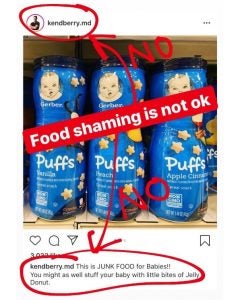Food bullying or food shaming can take on many forms. It can happen on food labels, in ads, in conversations, and in posts and comments on social media. I really wasn’t aware of food bullying and shaming until I became a mom, and I most likely unknowingly took part in the bullying when I used to make my food purchases based on fears rather than facts. Now that I am aware of it — and able to recognize it — I don’t let it persuade my food purchases anymore.
Just the other week I posted an example of food bullying from an account on Instagram. A doctor with over 100,000 followers shared a picture of Gerber baby puffs and wrote that they are “JUNK FOOD for babies!!” and then went on to falsely claim that they “slow your babies brain development, facial development and causes cavities.” He then continued on to call them “slow-poison.” I immediately recognized it as food bullying. It can elicit a fear-based response in any parent who has ever fed or feeds their children this product. They may even feel ashamed and guilty about it.

However, food has no moral value. Food isn’t inherently “good” or “bad” or “junk” or “unhealthy.” An entire diet can be unhealthy, obviously, but not just one single food item. These puffs, as well as any food item that someone may deem as “junk,” can absolutely be a part of an overall healthy diet. I decided to post specifically about this incidence of food bullying because these puffs were incredibly beneficial for my daughter. She had a stroke before she was born, which resulted in cerebral palsy, among other disabilities. Because of this, she has struggled with eating since she was born. Once it was time for us to introduce solid foods, we had a hard time finding something she could physically eat. This was the first solid food she actually had the ability to eat. They helped her to develop her chewing coordination and strength as well as her pincer grasp. They easily dissolve, so we didn’t need to worry about her choking either. It was because of this specific product that she was able to progress to more difficult foods.
Food isn’t simply its nutritional value — it can have value far beyond that. To state that one specific food item that you may have a negative opinion on shouldn’t be consumed by anyone and to falsely claim that it is “poison” and “harmful” isn’t just incorrect from a scientific standpoint. It’s classic food bullying.
Food bullying often occurs in the comments of social media posts, too. I’ve seen people with large followings tell others not to consume a product because they deem it to be “toxic” or “crap” or that it contains an ingredient that they don’t understand, so they tell them that it’s harmful. It often happens when people are trying to push organic food as well. Organic Valley and Stonyfield are some of the worst offenders. They employ fear-based marketing tactics to scare people about equally-as-safe-and-nutritious conventional foods so that they are bullied and shamed into purchasing their organic products. I’ve also written about how food shaming is used to market baby food in a previous article. Not only is this harmful because it makes others feel ashamed about their food choices, but it can be detrimental to health as well.
Food bullying typically comes from a place of privilege. Those who do it don’t necessarily understand that the people they are bullying may not have access, the financial means, or, in my daughter’s situation, the ability to eat the foods they falsely believe are superior. Those who can’t afford or don’t have access to the more expensive, fresh, organic produce that they are bullied into purchasing may end up eating less produce, which results in an overall less healthy diet than if they weren’t afraid of purchasing the equally-as-safe-and-nutritious conventional produce.
You shouldn’t feel guilty about your food choices, nor should you have to justify them. Recognizing food bullying and food shaming is the first step in learning how to stand up to it. Be confident and don’t be ashamed about your food choices. Call it out when you see it on social media, too. The ones doing the bullying may not even know they’re doing it and the ones being bullied may not recognize it either. Awareness is the first step in eliminating food bullying.
As Michele Payn states in the book, “Food Bullying: How to Avoid Buying BS”: “Food is a basic necessity, not an opportunity for manipulation. It is time to elevate the food conversation above B.S. so you can avoid frustration and anxiety the next time you are making eating choices.” So, enjoy a few extra non-organic, GMO cookies this season if you’d like, or don’t. It’s your choice and you shouldn’t be made to feel guilty about it. If you ever want legitimate help with your diet, I always recommend seeing a registered dietitian. They are qualified to help you with your specific nutritional needs, and if you’d like to learn more about food bullying, read Michele’s book and listen to her Food Bullying podcast.
Food Science Babe is the pseudonym of an agvocate and writer who focuses specifically on the science behind our food. She has a degree in chemical engineering and has worked in the food industry for more than decade, both in the conventional and in the natural/organic sectors.



